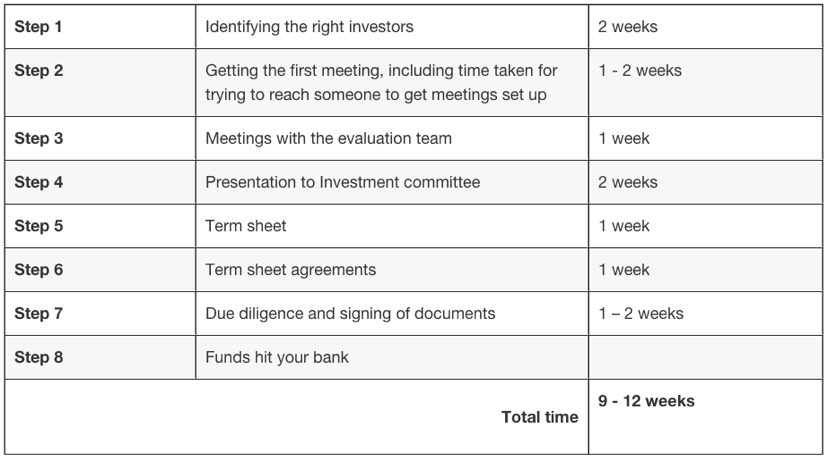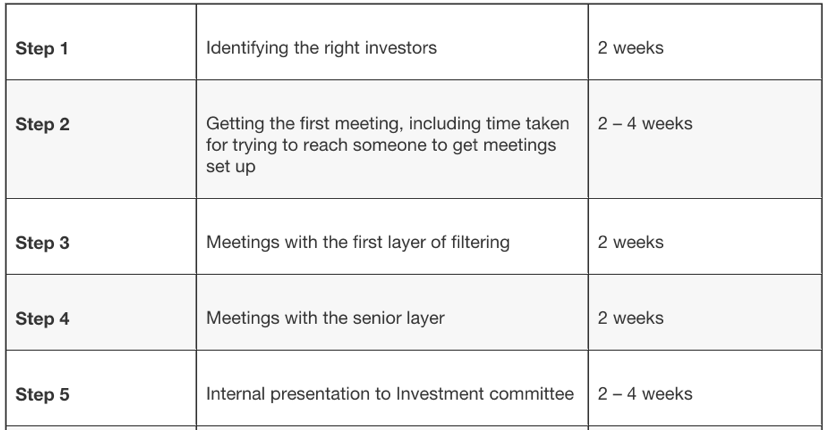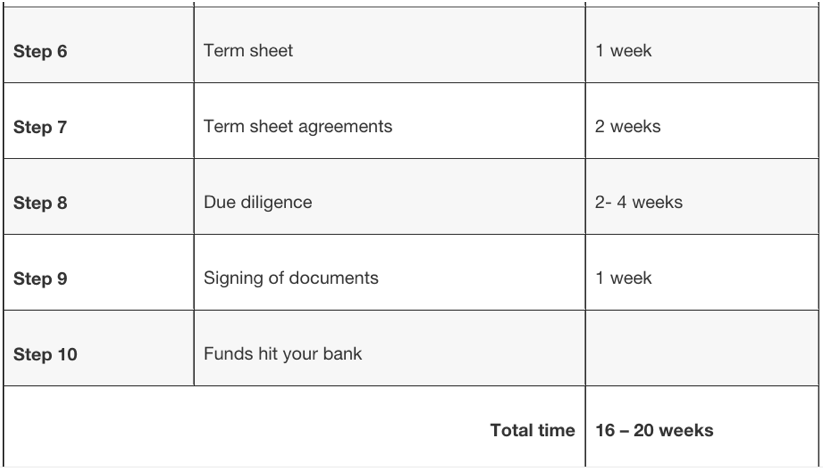
Often first-time entrepreneurs underestimate the time it may take to raise funds for their startup. Unless you get seriously lucky or have easy access to a number of investors, it is prudent to estimate anywhere between 3 – 6 months to get funded. And that is if you have a good plan and a great team.
Here are a few steps that are involved and approximate time it could take with angel investors:
Here are a few steps that are involved and approximate time it could take with institutional investors:
And these are fairly optimistic timelines with the investors who finally fund you. There will be several you would meet who may, out of genuine interest to invest, progress the discussions but may not conclude the deal for several reasons. And there will also be many who may decline to invest in the first meeting itself but still it will have taken 4 – 8 weeks to get the “No” as an answer.
Given the lengthy process, the entrepreneur should try to be selective about which investors they should approach. Investors, especially VC funds are clear about the kind of companies, the stage and the domains they would invest in, and that information is usually available on their websites.
One of the first things that entrepreneurs need to do is make a shortlist of who the ‘right’ investors would be.
- To begin with, you need to decide if you are ready for angel investors or for VCs.
- When applying to investors, check their websites and see if they have invested in businesses similar to yours and if your domain is within their interest areas. E.g. if you are a life-sciences company, there is no point in approaching investors whose focus areas are Mobile & Internet and Consumer Businesses.
- Check if there are synergies between any of their portfolio companies and your business, and if there are, then evaluate highlighting the same during your presentation.
- From among the many people at the VC, identify who in their team is more likely to be excited about your idea. This is easy to find because most VCs will have profiles of their team members, including details of which companies or domains that person is involved with.
Once you have identified the investor, and the person who you are going to connect with, try seeking an appointment by making a call to the office. Most likely, you will be asked to send the presentation to a generic mail id used for receiving business plans. Well, this is not something that you can always avoid. The truth is that investors get so many calls and mails requesting for meetings that it is almost impossible to accept all requests.
In most VC offices, business plans received will be reviewed with some level of seriousness, though most probably by the junior most executives who may not necessarily be experienced at taking a gut feel call on what seems like a good business case. If you are lucky to get past this stage, you will be asked to come and meet an associate. And that’s just fine. This is the first line of filter in a VC fund and an associate is expected to do a thorough evaluation based on their internal criteria, and then if and found suitable, are expected to move the deal up to a partner who can decide if the deal is to be presented to the investment committee.
If you pass the first line of filter in a VC fund, and this can take a few meetings, you would have to present to the next level. This round, depending on the interest of the fund, could take a few meetings with revisions and discussions on strategy, scale, funding needs, etc.
Once there is broad agreement on key areas, and if the deal fits into the internal criteria of the fund, the deal will be discussed at the investment committee meeting where the terms of the term sheet will be outlined.
After presenting the term sheet, the entrepreneur is expected to run it past someone who knows the legal stuff around term sheets…. And when you ask someone’s opinion, the person feels it obligatory to suggest a few changes. It then takes a few meetings and discussions to finalize the term sheet and sign off.
NOTE: Some VCs would discuss the terms of the term sheet offline over meetings and dinners, and therefore the draft presented to the entrepreneur on which there is an informal agreement on key points like valuations, control, vesting, rights and downside protection. However, the time taken would still be approximately be the same.
Once the term sheet is signed off, the due-diligence will start. Also, the startup may have to complete some tasks as part of the ‘conditions precedent’ and that could be things like filing for patents, getting an independent director on board, getting customer contracts signed, etc.
After all this is done, the final signing of the documents and receiving the cheque are the logical next steps.





























